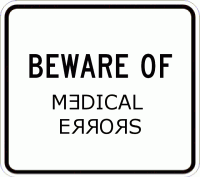
LINKS on MEDICAL ERRORS
surgical, pharmaceutical, etc. ---
errors by doctors, nurses, hospitals, etc.
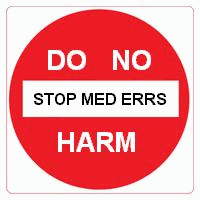

|
LINKS on MEDICAL ERRORS
surgical, pharmaceutical, etc. ---
|

|
Home page > This MEDICAL ERROR LINKS page
! NOTE !
Like most 'LINKS' pages on the web, there will, no doubt,
be more and more dead links on this page over time.
It may be years at a time before I return to this page to
remove dead links and replace some links with better links.
In the meantime, try 'WEB SEARCH' links provided on this page.
Please note:
"Make a habit of two things --- to help, or at least,
to do no harm." is a phrase that became common
in American medical texts in the late 1800's.
An earliest attribution is to Hippocrates, circa 400 B.C.
NOTE :
There is a common perception that U.S. doctors take an oath
of this nature when they graduate from med school.
This is not true. It is simply a statement by Hippocrates
that USED TO BE common in American medical texts.
Table of Contents:(links to sections of this page, below)
|
|
Where I'm Coming From (Background info) : After about 50 years of no hospital surgeries, I had three surgeries in one year (2005). I experienced medical errors first hand. Some were committed by nurses ... some by doctors. The doctors did not expend enough effort to make sure nurses took good care --- and to ensure that the nurses gave good post-op instructions. In some cases, doctors do not have enough respect for Mother Nature's designs and they get too aggressive in removing and revising things in your body. In some cases, this aggressiveness may be motivated because the doctor can add more chargeable items (codes) to the medical bill submitted to the insurance companies. It seems to be a game of trying to circumvent the obstacles to over-compensation that are erected by the insurance companies or by government compensation systems, like Medicare. You, the patient, are the pawn in the middle. In some cases, you may have an agreement with the doctor on limiting the extent of surgery (with the intent of reducing the "bull in a china shop" scenario). However, once you go under general anesthesia, all agreements are off. You no longer have any control over what happens to your body. The typical doctor seems to think his way is the only way and whatever he wants is what is done. In some cases, the doctor seems to have a "model plane builder" approach to surgery. That is, whatever looks prettiest is best. However, the real miracles happen after surgery, when Mother Nature takes over to do her magic in healing the slashes and abrasions and bruises of the surgery. At that point, Mother Nature does not need "prettiness". She needs tissue/cartilage/bone on which to build other tissue/cartilage/bone. That is not easy (or even possible) if too much has been removed or if surfaces are smooth as polished glass. For example, rough-surfaced cartilage is better than none at all. Also, Mother Nature needs some help from fluids, like lubricating fluids or cushioning fluids. Those fluids are not forthcoming if the fluid-making tissue has been removed --- for example, when too much synovial tissue is removed from joints. Synovial tissue makes the milky fluid that lubricates joints. And perhaps the fluid helps in providing components that help re-build or repair cartilage. Some info on my surgery-nurse-doctor experiences --- with knee, back, eye --- is on other links pages --- related to the knee, back, and eye. This page is meant to provide some information to try to rectify a really poor status of the U.S. medical system in regard to medical errors. (The U.S. is ranked near the bottom of about 35 'developed' countries with regard to containment of medical errors. In other words, the ratio of number of medical errors to number of hospital visits is relatively high in the U.S. --- some U.S. follow-up surveys indicate a rate of 40 to 50%.) Some advice for those considering surgery :
Some advice related to NURSES and surgery :
The need for patient-run, non-commercial
evaluation/review web sites We patients need web sites for recording our evaluations of medical-doctors and doctor-procedures and hospital-procedures (and drugs) --- like buyer-reviews of products at amazon.com. A lot of the reviews on such web sites would be junk or useless --- but many reviews would be extremely helpful, because the patients know a lot more about the end-result of procedures-and-protocols than their doctors know. The doctors do not even have the time to listen --- and, when they do listen, they listen through mostly-plugged, self-biased ears. Unfortunately, most medical education is assembled from a doctor's point of view --- never a patient's view, say, a year or so after the patient has been the recipient of procedures. It often takes a year or so for a patient to really evaluate the outcome of a procedure --- but who is going to have the time and patience to wait to gather that information in a comprehensive, proper, un-biased, and meaningful way. So far (2006), the only example of patient-source (not doctor- or hospital-source) information-gathering seems to be a survey by a foundation, the Kaiser Family Foundation --- which gathered helpful but very general patient feedback. The survey found that half ( 50% !! ) of all people with chronic conditions say that they have experienced a medical error in their own care or that of a family member. [Probably family members had to speak for patients who were rendered vegetables, or dead, by their "care". Also, family members have to speak on behalf of infants. The case of an overdose of blood thinner being given to the twin girls of the actor Dennis Quaid, circa 2006, comes to mind.] We need a Wikipedia for medical patients, so that an "encyclopedia" of patient feedback can be gathered relatively quickly and inexpensively --- and so that the information is edit-able and summariz-able by relatively expert, objective, good-intentioned patients. There was a Time magazine cover story (circa 2006) on doctors. Many of the doctors interviewed had serious concerns about their family members or themselves going into the hospital. These are examples of some candidates for helping edit such Wikipedias. But they are still not objective enough to be the only editors.
An example medical error case : If you think hospitals can be trusted to be objective and forthright, read the following story of a hospital that would not even make their procedures public --- nor available to a patient and the family. What do they have to hide? Or, more to the point, should they be allowed to hide their procedures from patients, their customers? from the community that they are supposed to serve? This story is from the Saturday 4 November 2006 Daily Press of Newport News, Virginia.
Headline: $1 million Riverside verdict upheld. Start of quote (comments in brackets and in bold font are mine) : Newport News - The Virginia Supreme Court ruled Friday that Riverside Regional Medical Center must pay a $1 million medical malpractice judgment to the family of a woman who broke her hip when she fell while walking in the hall outside her hospital room. Elaine Johnson, 79, was admitted to the hospital in 1997 for observation because she was weak, confused and disoriented, court records show. She also was dehydrated, agitated and hallucinating but the hospital staff failed to identify Johnson, who suffered from lymphoma, as a high fall-risk patient or take precautions to prevent her from getting out of bed and falling. She fell a few days later and fractured her hip, court records show. Johnson's health began to deline after the fall and she died a year later. Johnson's family sued Riverside in 2001, claiming it was negligent in its care of Johnson. In November 2005, a jury agreed Riverside was responsible for Johnson's fall and ordered the hospital to pay the family $1 million. Riverside appealed, claiming the trial judge erred when he allowed evidence about patient falls at Riverside and other hospitals to be introduced. [This reminds one of alleged criminals objecting when their previous crimes are brought up at a trial.] Hospital officials also protested releasing Riverside's staff orientation instructions and nurse training materials and quality control data about falls that occurred at the hospital. [What do they have to hide? An atrocious record of patient falls? Are they afraid that, in this case, staff and nurses did not follow orientation and training instructions? It is difficult to see how procedures will be rigorously followed if the hospital continually hides its mistakes from its customers and from the community that the hospital is supposed to serve.] But the state Supreme Court disagreed and upheld the $1 million verdict. [The community should be thankful that the court had the courage to "do the right thing" in allowing orientation and training materials, and incident reports, to be presented.] The court's ruling clears the way for people to finally gain access to hospital incident reports and databases, said Avery Waterman, the family's attorney. In the past, such incident reports and databases were labeled as quality control documents, which are privileged and not open to public scrutiny, he said. End of quote (newpaper story). [The administrators and directors and policy-setters of this hospital deserve to be in a national Hall of Shame. One has to wonder about the stories behind those other "incidents". After reading a story like this, you might feel like you need a shower. The story drips with the sleaze emanating from the administrators who do not want to reveal their training procedures to their customer-patients.] [Irrespective of whether Riverside was responsible for Johnson's fall, it seems to only encourage poor patient care if hospitals are allowed to hide their procedures and their "incident reports" from their patients, the families, and the community.] |
|
Note1:
Note2: End of Table of Contents, and end of background info. Start of link sections. |
Medical Errors - GENERAL INFO - web pages
< Go to Table of Contents, above. >
|
Medical Errors - FORUMS - web pages
< Go to Table of Contents, above. >
|
Medical Errors - BLOG STORIES - web pages
< Go to Table of Contents, above. >
|
Medical Errors - SURGICAL - web pages
< Go to Table of Contents, above. >
|
Medical Errors - PHARMACEUTICAL - web pages
< Go to Table of Contents, above. >
|
Medical Errors - 'WEB DIRECTORY' pages
< Go to Table of Contents, above. >
It seems that 'web directories' are dying out. Google and Yahoo closed theirs down around 2014. Then around 2017, the directory from which the Google and Yahoo web-directories were spawned --- the DMOZ "Open Directory Project" closed down. It seems that it is just not feasible for a team of people to keep up with all the sites that are going dead and the new sites that appear. About a year after the dmoz.org site closed down, it appears that a new web-directory site --- curlie.org --- arose from the ashes of 'dmoz.org'. It remains to be seen how long that web-directory lasts. Following are a few links related to 'web directory' sites.
|
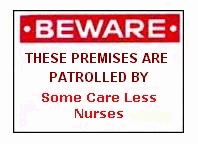
|
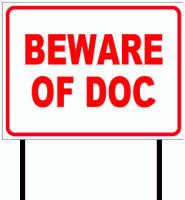
|
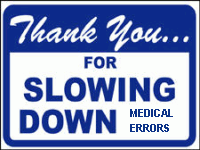
|
The signs above were made by taking typical
warning/caution/danger/think/traffic signs
and adapting them to the topic of medical errors.
|
Bottom of this
To return to a previously visited web page location, click on
the Back button of your web browser, a sufficient number of times.
OR, use the History-list option of your web browser.
< Go to Table of Contents, above. >
Or you can scroll up, to the top of this page. Page history:
Page was created 2006 Aug 09.
|